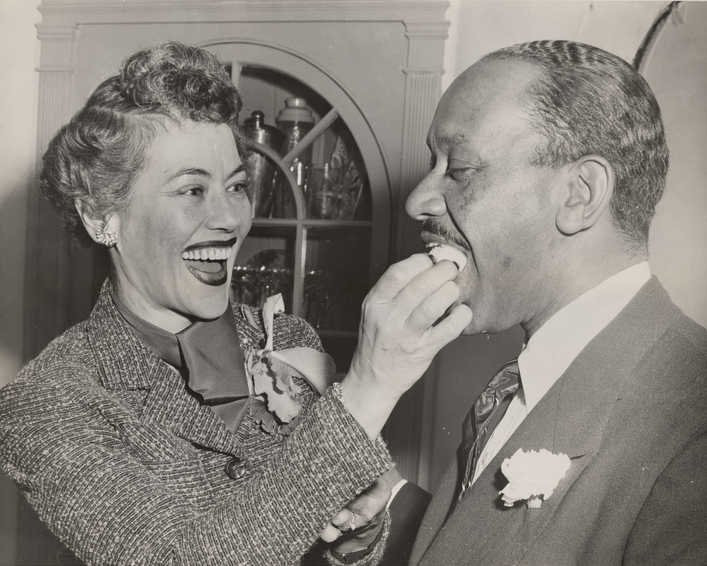The most stressful weddings found in fiction.
As crocuses bloom and pollen kicks up, we enter wedding season. Weddings, with their abundant rites, tend to call up a lot. There’s the psychological freight. The expenses. The freak-outs inevitable when two families collide. We say a wedding is about the love of two people, but a wedding ceremony involves a whole village of combustible forces. Often as not, eruptions occur.
Fiction abounds with bad marriages. (Here are just a few that have been on my mind this season: Causabon/Dorothy, Stoner/Edith, the Fleishmans, the Rochesters, Pauline/Cholly…) And tracing the lead up to the aisle is a whole established plot unto itself. So I want to take a moment to consider some fictions that highlight the strangeness of the ceremony, in something like isolation. And you reader, are invited. ‘Cause I got a plus one.
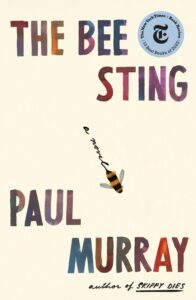
Paul Murray, The Bee Sting
Paul Murray’s nail-biter of a family epic hinges on a worst-case-scenario wedding. Spoiler alert: these ill-fated nuptials involve injuries superficial (see: the title) and grand (see: lifelong coercion, cruelty). The skinny? Imelda was really in love with Dickie’s brother, Frank—but then he died in an accident. United in grief, Imelda and Dickie have a moment that leads to a pregnancy which leads to a shotgun wedding. Theirs is thus a ceremony brewed in tragedy, and flavored with vaguely religious compulsion and the seeds of a lifelong resentment.
One can read this whole book along family abolition lines, as a cautionary tale for what happens when we put too much pressure on a single day. Remember, Murray seems to be saying: you don’t have to walk down the aisle.
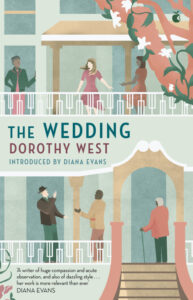
Dorothy West, The Wedding
I am here to sing the praises of Dorothy West, plain and simple. Her canon of sharply observed realist novels slyly lampooning the Black bourgeoisie really speaks to This Reader. And in her long-awaited second novel, which she published at 87 years old, West takes on colorism, class, ambition, intra-racial regional differences, and a paternity scandal.
The nitty-gritty: when Shelby Coles, a scion of Oak Bluffs royalty, marries a white jazz singer, she precipitates a whole mess of interpersonal crises within her family. We zoom in and out of everyone’s business, but by unspooling the action around the contested main event West brilliantly shows what a wedding can symbolize for the guests.
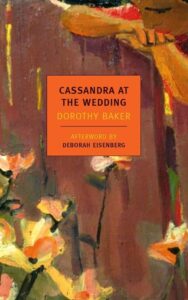
Dorothy Baker, Cassandra at the Wedding
I fell instantly in love with the sour, witty Cassandra, our chief narrator in this slim, witty novel. Her singular voice seduces as she throws 150-plus pages of shade on her twin Judith’s wedding at the family ranch. True to her Grecian namesake, Cassandra repeatedly cautions against the unwelcome event, and tries to thwart it. Her efforts are complicated by the appearance of the twins’ father, “a brandy-soaked retired professor.”
From the vantage of a disenchanted guest, we get a pretty filthy read on marriage as a concept. But I hasten to add that this book is more funny than bleak. Don’t believe me? Stay tuned for the film adaptation, currently in development thanks to the steady comedic hands of John Early and playwright Sarah DeLappe.
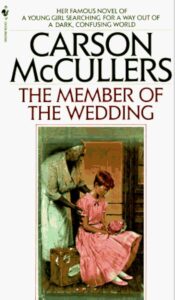
Carson McCullers, The Member of the Wedding
This Southern Gothic coming-of-age tale tells the strange, luminous story of Frankie, a young girl who wants to belong to something bigger—like maybe, her brother’s marriage. A close look at The Ceremony through the eyes of someone straining to understand its significance, this modern classic is too meaty to distill into a single argument. (Though this hasn’t stopped people from trying.) But via Frankie, McCullers seems to be questioning the normative narrative that we must end up going two by two.
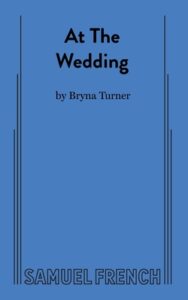
Bryna Turner, At the Wedding
Quite by coincidence, a theme emerges! (Also, speaking of plays…) In this delightful, unexpectedly poignant comedy, a woman called Carlo goes through a familiar rite and ringer—attending the wedding of an ex. Though as in Cassandra’s and Frankie’s and the Coles’ cases, the wedding here is mostly a tribulation for the guest(2) we see the celebration through, Carlo’s tangos with ghosts capture the special ache that can attend this ceremony. This play will make you laugh, then put you in mind of all the endings a wedding necessitates. What loves have to die or change shape, so the party can go on?


